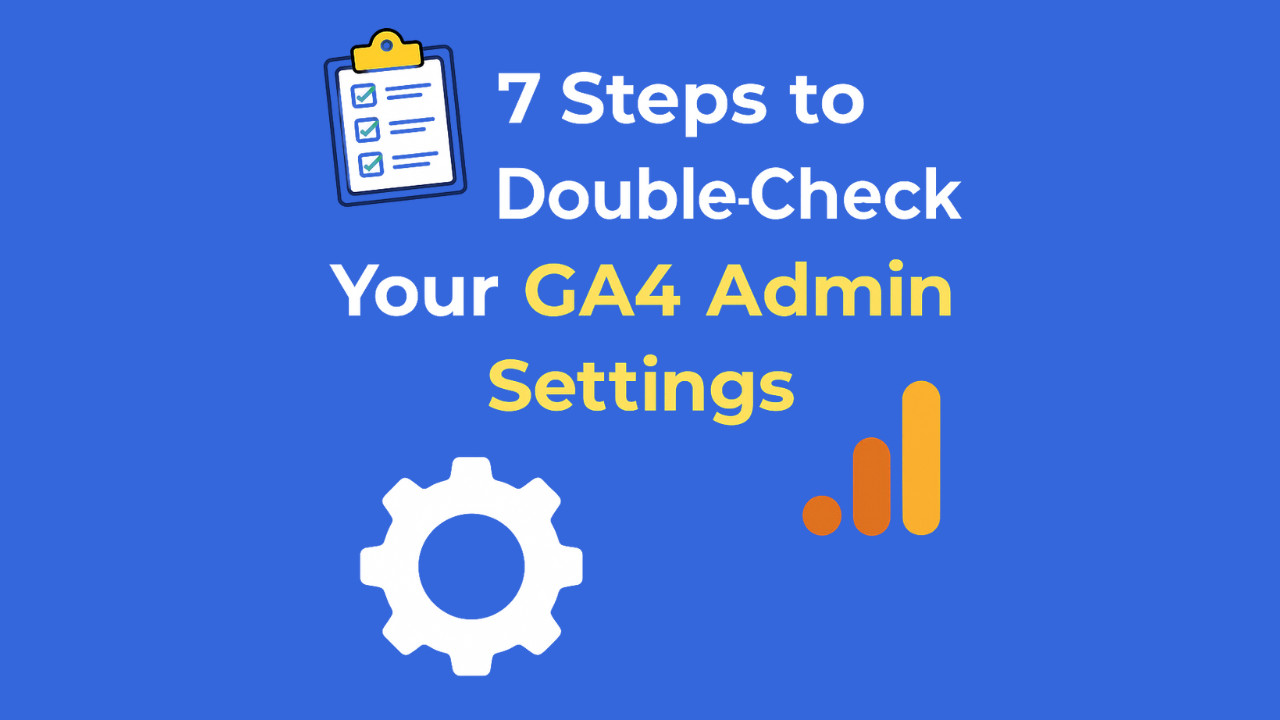Quick Wins for Car Dealers Who Want Better Data—Without Getting Technical
You don’t need to be a data nerd to make sure your Google Analytics 4 (GA4) setup isn’t broken.
But here’s the problem: Most dealership GA4 properties I audit? They’re either:
- Set up wrong
- Missing key data
- Or bloated with events that don’t mean anything to your bottom line
This quick guide walks you through how to double-check your core GA4 settings — no dev team required. Whether your vendor set it up or you’re trying to clean up after one, these steps will show you how to protect your data, clean your reports, and regain control.
Let’s dig in!
1. Find Your Measurement ID
Where to go:
Admin → Data Streams → Click your active stream
Your Measurement ID is the unique code that tracks all user behavior on your site. If vendors or chat tools are using the wrong one (or a UA ID instead), you’re not getting clean data.
Why It Matters:
This ID connects everything — GA4, tag managers, events, even chat tools. If it’s misfiring or duplicated across streams, your reports are toast.
🎯 Quick Check:
- Make sure there’s only one active stream
- Confirm it matches the one used by your website + third-party vendors
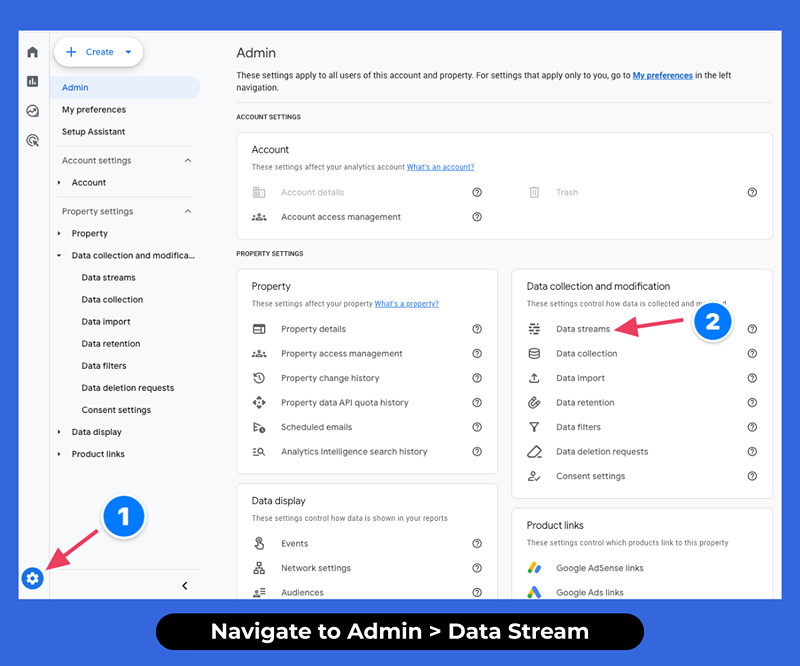

2. Set Up or Review Your API Secret
Where to go:
Admin → Data Streams → Click your stream → Measurement Protocol API Secrets
This one gets overlooked all the time — and it’s critical. The API Secret enables trusted third-party tools (like Call tracking systems or chat providers) to send conversion events directly into GA4 using server-side tracking.
Why It Matters:
If your tools are trying to send conversion events without this? GA4 may block or ignore them entirely. That means your numbers are wrong… and no one knows it.
🎯 Quick Check:
- If you don’t see an active API secret, create one
- Give it a clear label (like “CarNow” or “CallRevu”)
- Don’t worry — you’re not touching code here. Just setting permissions.
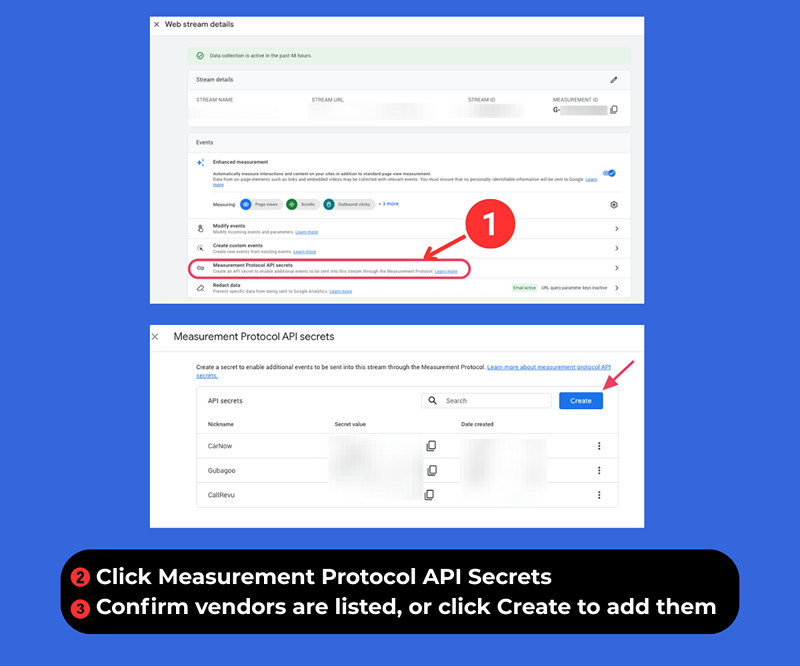
3. Check Your Data Retention Settings
Where to go:
Admin → Data Settings → Data Retention
This one’s sneaky. GA4 defaults to 2 months of user-level data which means you can’t compare performance month-over-month, quarter-over-quarter, or year-over-year. That’s a huge issue for marketing audits and vendor accountability.
Why It Matters:
If you’re trying to analyze long-term trends or behavior across multiple visits, short retention will completely cut you off. Setting it to 14 months gives you full visibility without losing insights.
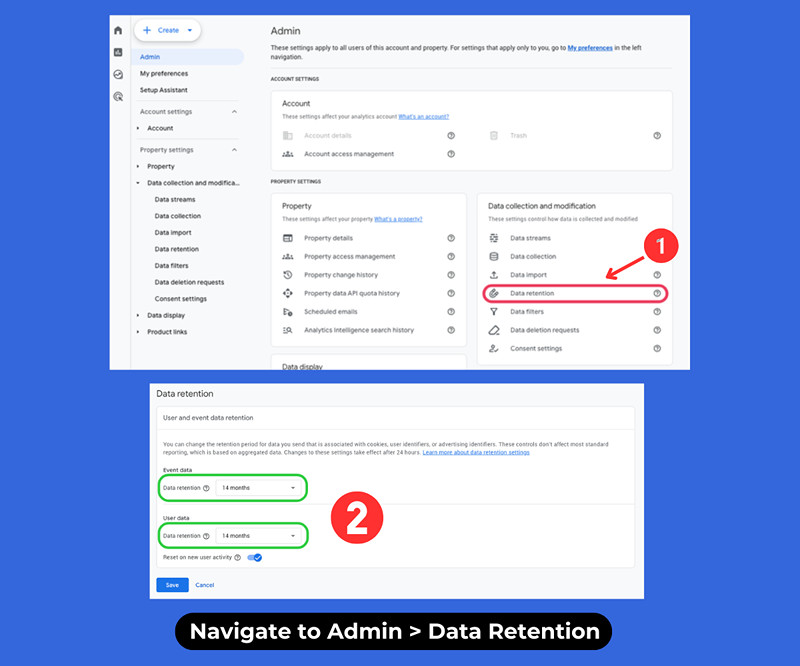
4. Review Your Custom Definitions
Where to go:
Admin → Data Display → Custom Definitions
This is where your reporting power really kicks in. If you’re not defining VDP Views, Form Submits, Click-to-Call, etc. as custom dimensions or metrics, you’re missing the ability to segment or filter by those in Looker, Explorations, or dashboards.
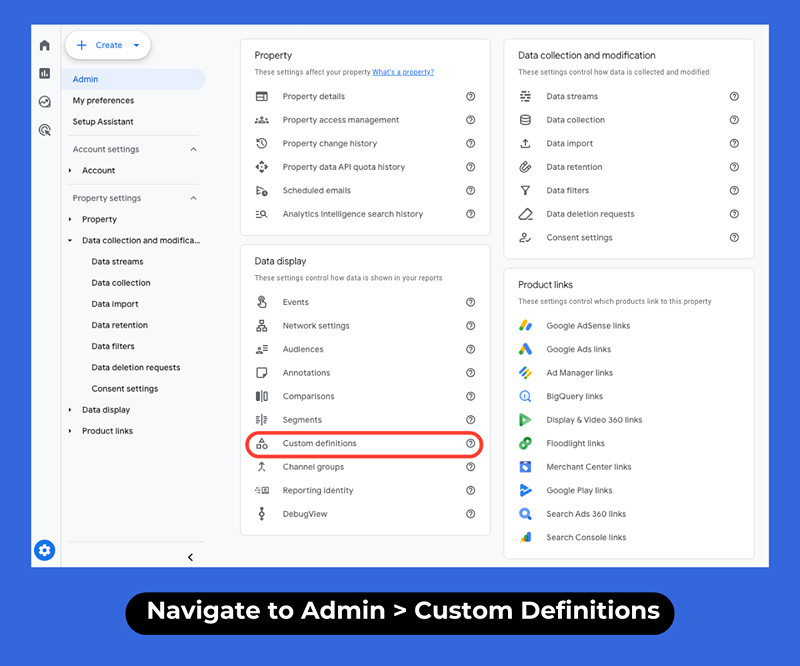
Why It Matters:
Events can be firing all day—but without custom definitions, they’re just noise.
GA4 won’t automatically label your data in a meaningful way without these mappings.
Want to answer questions like:
- “Which vendor drove the most VDP views?”
- “Which CTA was clicked the most?”
- “Which form generated the most leads?”
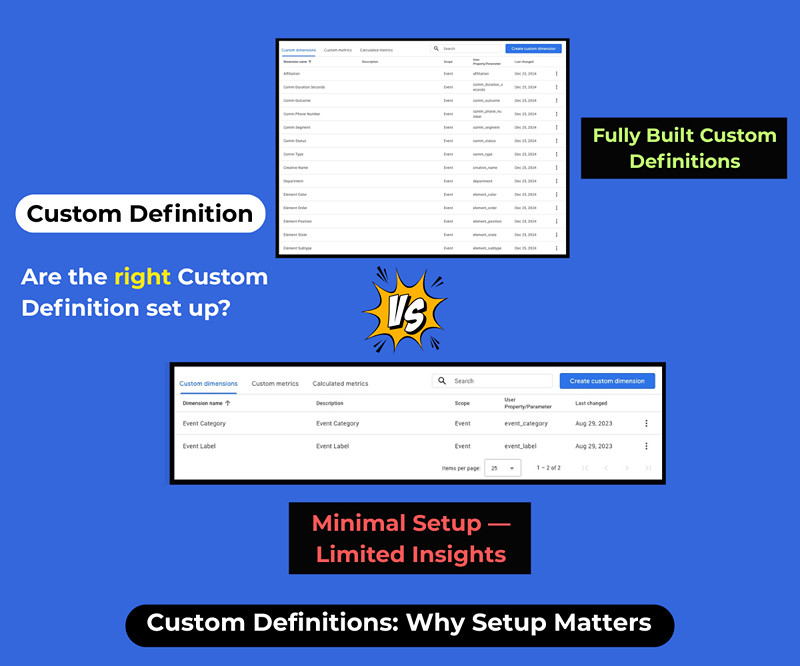
5. Verify Your Events & Key Events
Where to go:
Admin → Data Display → Events
⚠️ Heads up: Your layout may look different.
Depending on your GA4 property, you’ll either see the legacy layout or the new layout for Events and Key Events.
In the new version, Key Events are now managed within the “Events” tab, no longer listed separately in the left-hand menu.
Look for the ⭐ icon in the far-left column next to each event — this is how you promote a standard event to a Key Event in GA4.
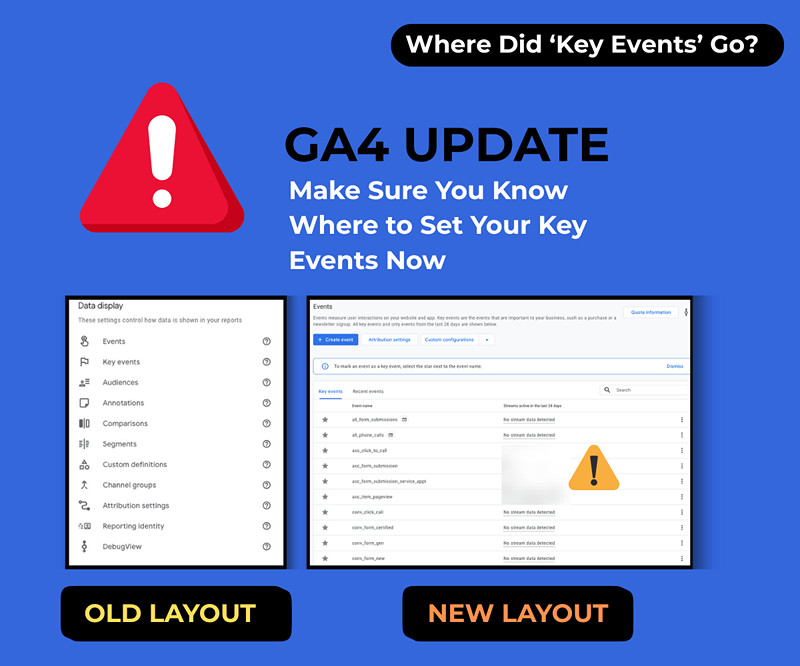
Why It Matters:
This is where most vendors screw things up and where you can spot it fast.
You’ll see a list of all events firing in your property:
- Some are automatic (like page_view)
- Some are vendor-specific
- Others should follow ASC naming standards (e.g., asc_comm_submission, asc_form_submit, asc_click_to_call)
Reminder: ASC events should be firing from multiple vendors, not just your website provider. If your Call Tracking provider, chat tool, or service scheduler isn’t showing up here, you’re missing data that GA4 could be using to shape your strategy.
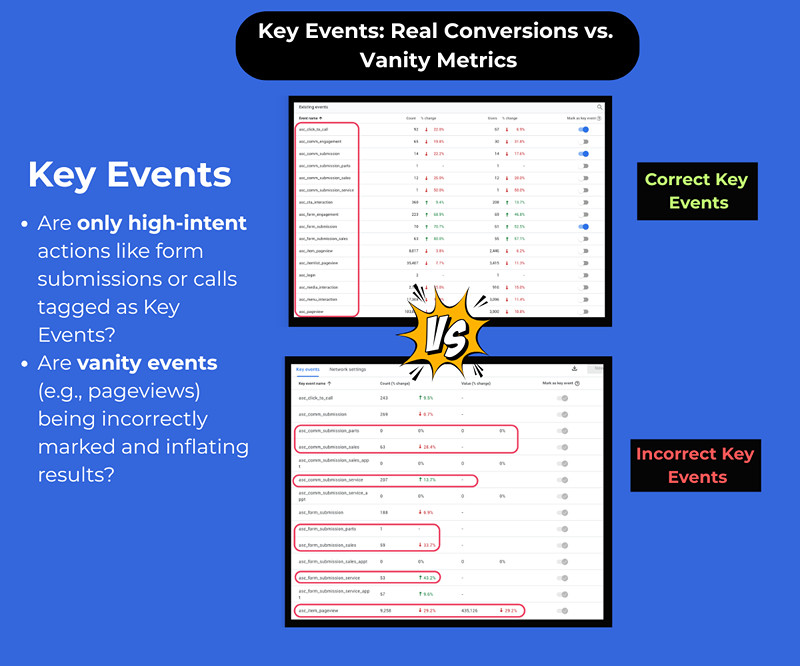
6. Check Which Vendors Are Actually Sending Events
Not seeing any ASC events? Only your website provider listed as the Event Owner?
That’s a red flag — every vendor tool on your site should be firing events into GA4.
You can quickly check this inside GA4:
Go to:
Reports → Engagement → Events
Use the + Add secondary dimension dropdown → Select “Event Owner”
Search for “asc” in the filter bar to zero in on ASC-standard events.
You’ll see:
- Which ASC-tagged events are firing
- Who is sending them (your website provider, chat tool, service scheduler, etc.)
💡 If you only see one vendor listed, you’re missing data.
All partners, from digital retailing to chat, should be firing trackable events into GA4.
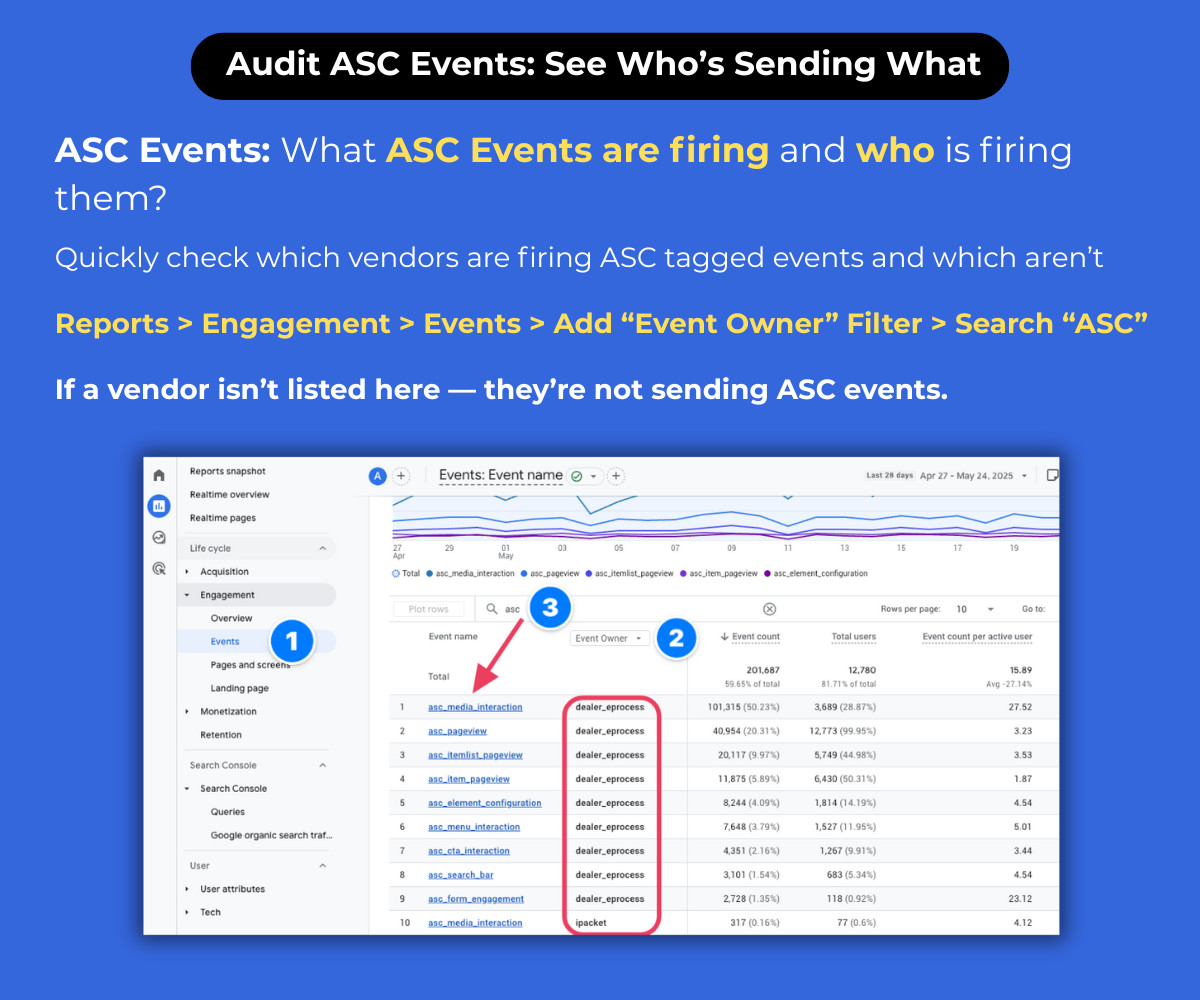
7. Confirm Google Ads & Google Search Console Are Linked
Where to go:
Admin → Product Links → Google Ads / Search Console
This step is often skipped and severely limits your visibility.
- Without linking your Google Ads account, you lose attribution transparency
- Without linking Search Console, GA4 won’t show which search queries are driving traffic
But it’s not just about linking…
You need to have access to your dealership’s Google Ads and Search Console accounts too or you’re only seeing part of the picture.
Vendors may have linked their accounts, but if you can’t get in, you can’t verify what’s actually happening. That’s a visibility gap you can’t afford.
Why It Matters:
If you see traffic spikes in GA4 but can’t match them to search or ad activity, your data story is incomplete — and your vendor might be masking the truth.
🎯 Quick Check:
- Under Product Links, confirm both Google Ads and GSC are active
- If not, click “Link” and walk through the prompts — it takes 2 minutes
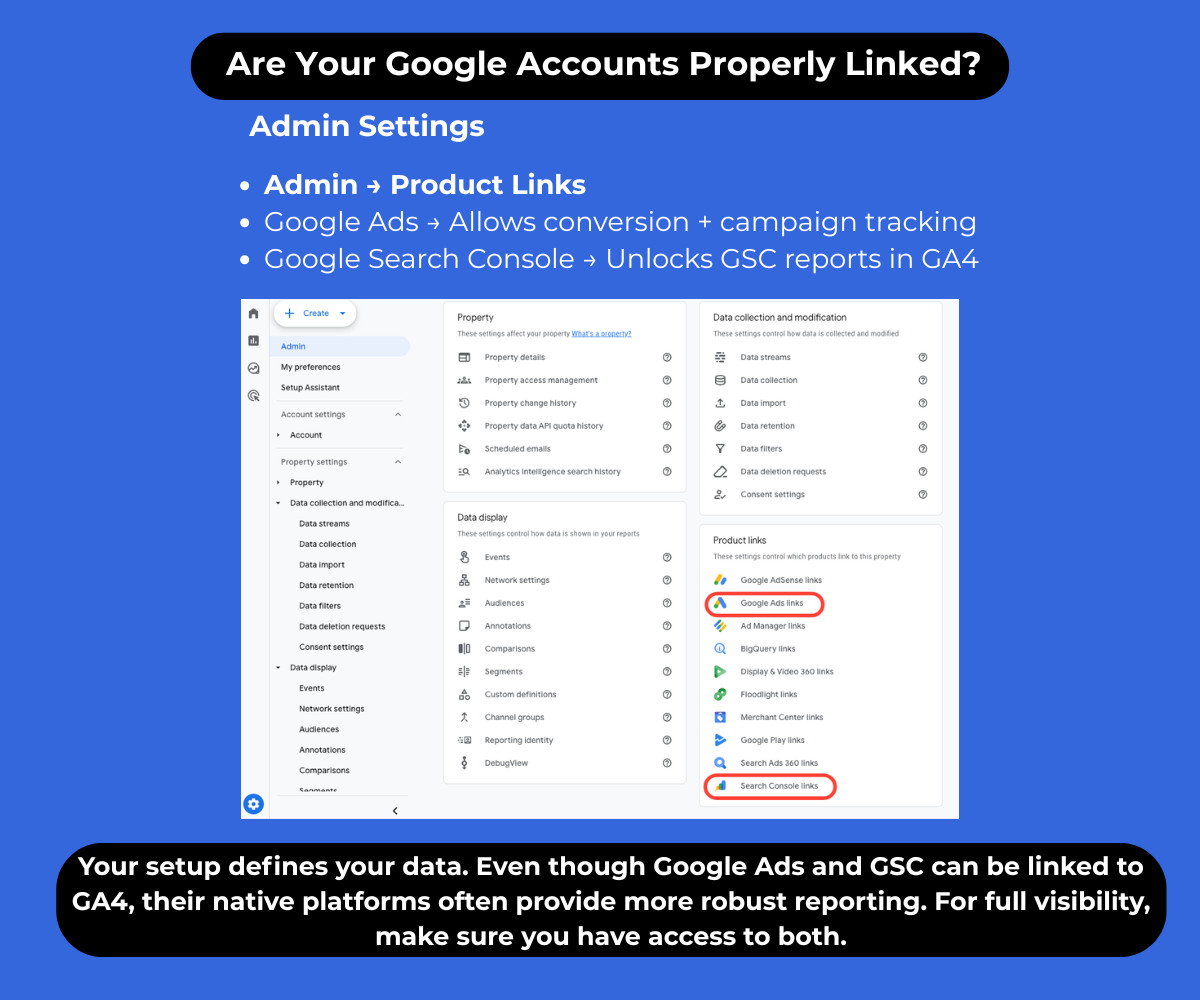
Final Thought:
This isn’t about becoming a GA4 expert, it’s about making sure your data actually means something.
These simple checks take less than 15 minutes, but they can save you months of confusion, thousands in wasted spend, and help you hold your vendors accountable to real performance — not padded reports.
📞 Want a Second Set of Eyes on Your GA4 Setup?
If you’re not sure your GA4 property is set up correctly or if vendors are actually sending the right events, let’s take a look together.
At BZ Consultants Group, we offer a complimentary GA4 audit to:
- Review your core admin settings
- Verify ASC event tracking
- Confirm vendor involvement
- Flag red flags before they cost you leads or budget
Reach out to schedule your free audit — no pressure, no fluff, just facts.

